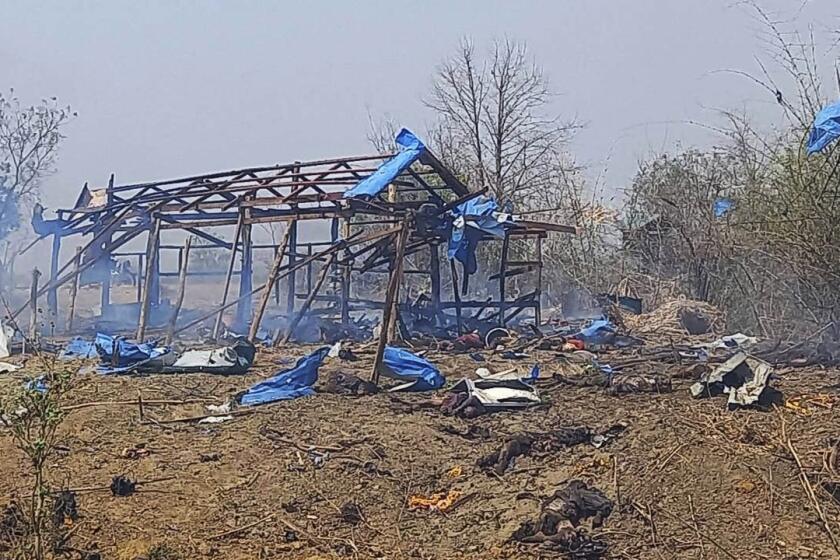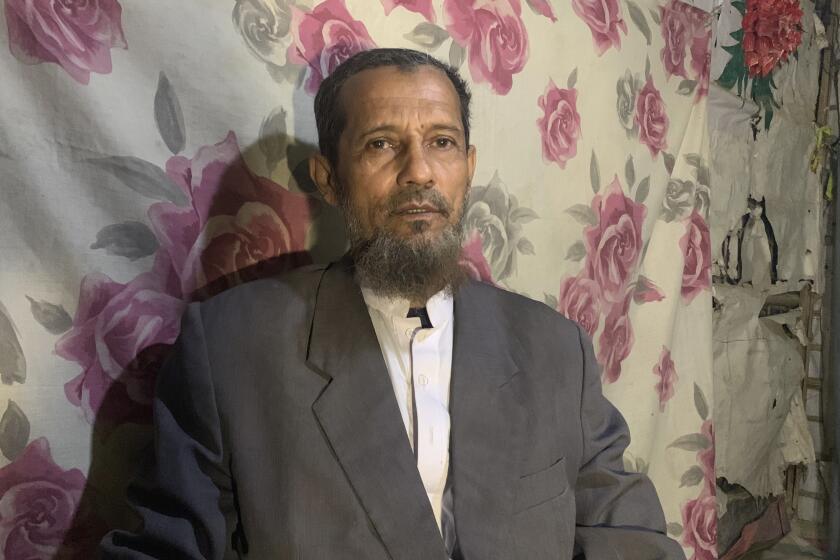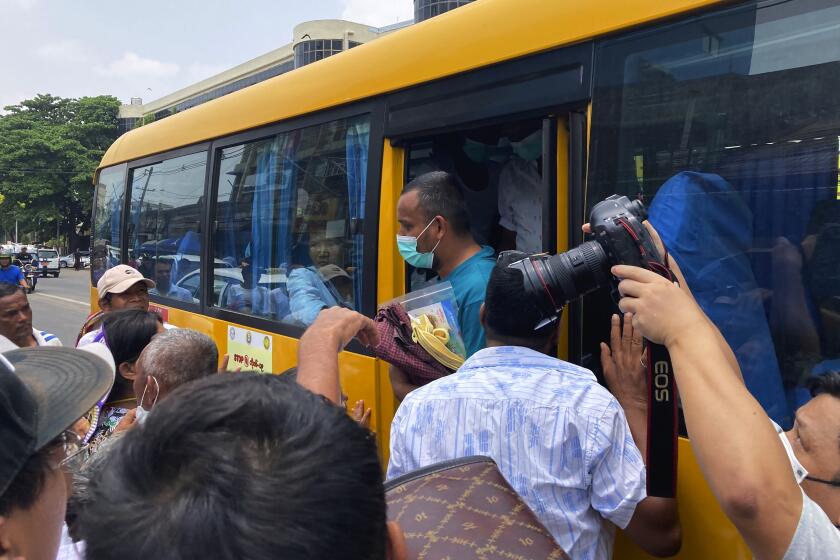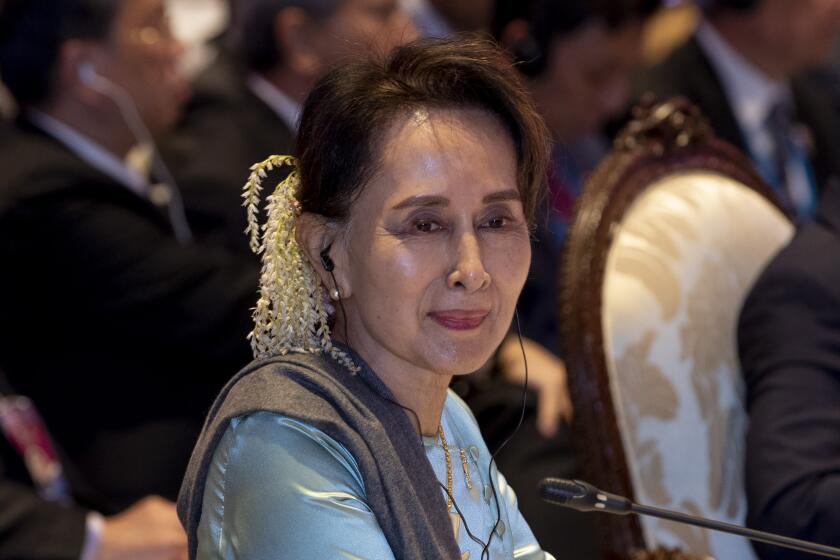At least 145 dead from Cyclone Mocha, Myanmar says
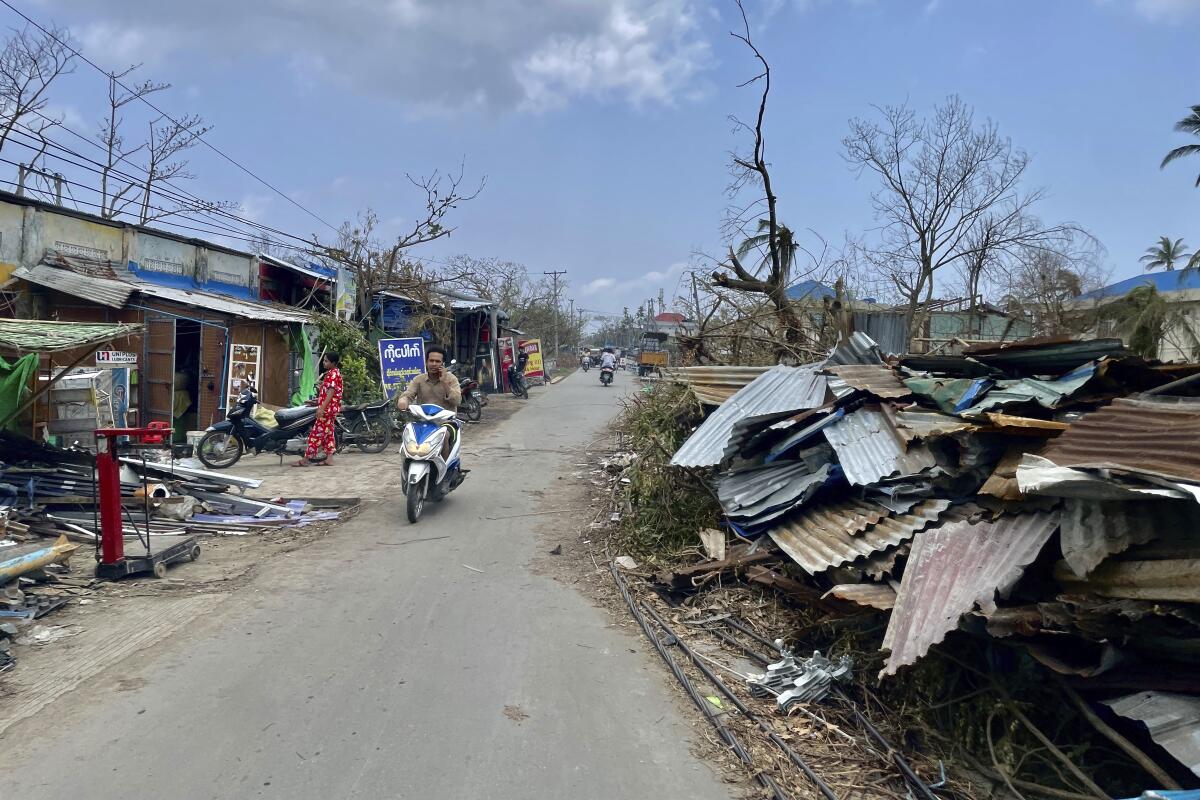
- Share via
BANGKOK — The official death toll from the powerful cyclone that struck Myanmar has burgeoned to at least 145, including 117 members of the Muslim Rohingya minority group, state television reported Friday.
It said the figure applied to the western state of Rakhine, where Cyclone Mocha did the most damage, but did not say how many storm-related deaths there have been in other parts of the country.
The accounting of casualties from the cyclone has been slow, in part because of communication difficulties in the affected areas and the military government’s tight control over information. The military government has said that unofficial death tolls surpassing 400 are false, but in the absence of independent confirmation, uncertainty remains about the actual extent of casualties and destruction.
Mocha made landfall near Sittwe township in Rakhine state Sunday afternoon with winds of up to 130 mph before weakening inland. The cyclone, the nation’s most destructive in at least a decade, brought widespread flash floods and power outages, while high winds tore roofs off buildings and crumpled cellphone towers.
“Millions of people live in the path of the cyclone and a massive effort is now underway to clear debris and provide shelter to those whose homes have been damaged or destroyed,” the United Nations Office for the Coordination of Humanitarian Affairs said Thursday. “Coastal Rakhine took the heaviest hit from the cyclone with severe impacts across the northwest and some damage in Kachin [state] also reported.”
Friday’s report on MRTV state television said four soldiers and 24 local residents in Rakhine, in addition to the 117 Rohingya, had been killed. It blamed the deaths on people refusing to evacuate their homes despite warnings from the authorities before the storm hit.
Airstrikes by Myanmar’s military may have killed as many as 100 people, including children, at a ceremony held by opponents of army rule.
The authorities evacuated 63,302 of the 125,789 Rohingya sheltering in 17 camps in 17 townships including Sittwe, starting May 12,MRTV said.
The station’s reports identified the Rohingya as “Bengali,” the official designation used for the minority group to suggest that they immigrated to Myanmar illegally.
Rohingya have lived in Myanmar for generations, but they are not recognized as an official minority there and are denied citizenship and other basic rights.
The Rohingyas caught in the storm lived mostly in crowded displacement camps, to which they were moved after losing their homes in a brutal 2017 counterinsurgency campaign led by Myanmar security forces. Their ramshackle housing on low-lying land was battered Sunday by a storm surge.
Rohingya refugees in Bangladesh’s sprawling camps have welcomed an announcement by the U.S. calling their repression in Myanmar a genocide.
More than 700,000 other Rohingya fled in 2017 to refugee camps in neighboring Bangladesh, which also suffered damage from the cyclone but reported no deaths.
The U.N. humanitarian affairs office’s report did not give a death toll for the storm, but said casualties and missing people were still being documented, including internally displaced people.
Theinn Shwe, a teacher from Headway Education Center for the Rohingya community in the camps, said Friday that the bodies of at least 116 people from 15 camps and villages, including 32 children and 46 women, had been given burial rites. He said reports that some had declined to evacuate were accurate.
Although the authorities have provided some food and shelter assistance, there is still a need for more, he said, adding that aid from international organizations and private donors had not yet arrived.
Start your day right
Sign up for Essential California for the L.A. Times biggest news, features and recommendations in your inbox six days a week.
You may occasionally receive promotional content from the Los Angeles Times.
“If the authorities give travel authorization to international organizations as soon as possible, the Rohingyas here will get help quickly. If the travel authorization is limited, the people here are likely to suffer more,” Theinn Shwe said.
The U.N. humanitarian affairs office said there was an urgent need for fuel to ensure key public services, notably healthcare and water treatment.
“Clean water supplies are a concern. Other critical needs include shelter, food aid, medical supplies, and healthcare services. In flooded areas, concerns persist about the spread of waterborne disease and the movement of landmines,” a legacy of decades of civil conflict in Myanmar.
“Unimpeded humanitarian access to affected populations in the impacted areas is critical,” it said.
Myanmar’s ruling military junta released 3,000 prisoners in a holiday gesture, but it was not clear if those released include political detainees.
Hla Thein, Rakhine state spokesperson and attorney general, said Thursday that there were no restrictions on local or international organizations sending aid, an assertion that could not be independently confirmed.
A previous military government was harshly discredited when it delayed the acceptance of outside aid in 2008 when Cyclone Nargis hit Myanmar with a storm surge that devastated populated areas around the Irrawaddy River delta. At least 138,000 people died, and tens of thousands of homes and other buildings were washed away.
State media carried extensive coverage this week of domestic efforts to provide disaster relief by the current military government, which seized power in 2021 from the elected government of Aung San Suu Kyi. It is engaged throughout much of the country in warfare against armed resistance groups opposed to military rule.
Several nations, including India, Japan, Britain and the U.S., have already earmarked monetary or material assistance to help recovery from Sunday’s cyclone.
Myanmar’s ousted leader Aung San Suu Kyi is sentenced to seven years in prison in the last of a string of criminal cases against her.
On Thursday, three Indian navy ships carrying relief supplies reached Yangon, Myanmar’s largest city, and a fourth ship was to arrive Friday, said Indian External Affairs Minister Subrahmanyam Jaishankar. Yangon is southeast of the cyclone-hit area and has a major international port.
“The ships are carrying emergency food items, tents, essential medicines, water pumps, portable generators, clothes, sanitary and hygiene items,” Jaishankar said in a message posted on Twitter.
More to Read
Sign up for Essential California
The most important California stories and recommendations in your inbox every morning.
You may occasionally receive promotional content from the Los Angeles Times.
